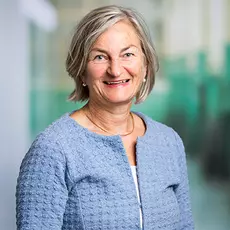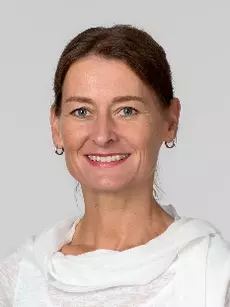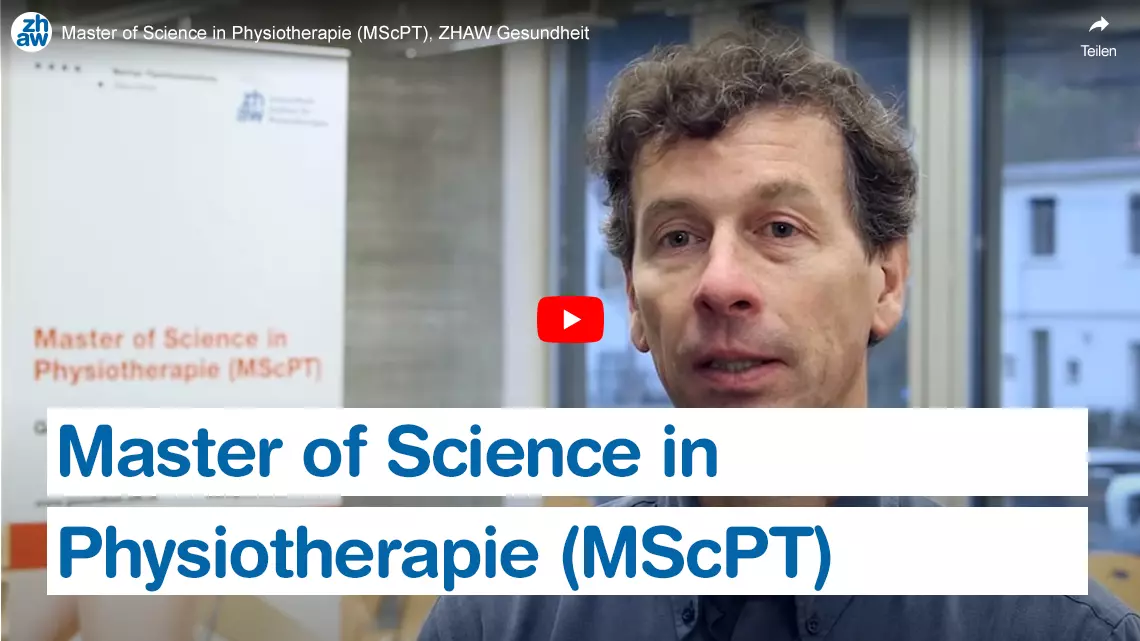Master in Physiotherapy

“Our programme strengthens your scientific and clinical skills, equipping you with specialised, advanced, and new tasks in physiotherapy practice.”
Prof. Dr. Karin Niedermann, Head of MSc in Physiotherapy
The MSc in Physiotherapy is a postgraduate degree with a clinical specialisation and a scientific orientation.
Five reasons to obtain an MSc degree in Physiotherapy at ZHAW
- You will advance your knowledge, clinical expertise, and ability to use applied research methods.
- Internships will help you become familiar with new professional fields.
- Distinguished Swiss and international lecturers will provide you with different perspectives and new ways of thinking.
- You will become well-equipped to meet new healthcare challenges.
- A variety of professional opportunities will open up for you, including the opportunity to study for a doctorate (PhD).
Master of Science in Physiotherapy
Admission Requirements
- Applicants with a Bachelor of Science (BSc) in Physiotherapy from a Swiss or foreign university, worth at least 180 ECTS credits, and a professional qualification (license to practice), or a recognized, equivalent qualification in physiotherapy (physiotherapy diploma, subsequent title acquisition (NTE) and proof of experience in scientific work amounting to 5 ECTS credits)
- Proof of experience in scientific work amounting to 5 ECTS credits
- International applicants whose native language is not German must provide proof of B2 German at the time of application
- Employment: part-time work of between 30% and 60% is recommended
- NTE: Holders of qualifications awarded in the 1990s by professional colleges that later became universities of applied sciences may contact the State Secretariat for Education, Research and Innovation (SERI) to obtain a UAS title on the basis of their previously awarded qualifications.
Further information / Registration / Dates
Guidelines for Students with Visa Requirements
Programme Structure
This Master’s degree programme has a modular structure and is composed of five competence areas: clinical or non-clinical specialisation, advanced practice, research methodology, transfer modules, and a Master’s thesis. It is a part-time course of study consisting of six semesters worth 90 ECTS (European Credit Transfer and Accumulation System) credits. Professional employment of between 30 to 60 percent is recommended for an ideal combination of theory and practice. The Master's degree programme is carried out together with other specialist disciplines such as nursing or midwifery, thereby enhancing communication skills and understanding of the profession.

Focus Areas
There are four clinical focus areas: Musculoskeletal Physiotherapy, Physical Activity, Sports, and Paediatrics. These modules provide knowledge and practical skills in diagnostics, therapy, and the prevention of disease-related problems relevant to physiotherapy. The modules of the non-clinical focus area of professional development teach students how to develop and implement evidence-based physiotherapeutic treatment concepts, assessments, and interventions.
| 2024 | 2025 | 2026 | 2027 |
|---|---|---|---|
|
Sports |
Musculoskeletal Physical Activity |
as in 2024 | as in 2025 |
Advanced Practice
The advanced practice modules prepare students for their future role as advanced physiotherapy practitioners. You will also extend your knowledge and skills in communications, public relations, and counselling in various roles and settings.
Research methods
The modules in this focus area provide in-depth knowledge of clinical research methods in a physiotherapeutic, medical, interdisciplinary, and professional context. You will work with our practice partners on research projects in the Research Ethics and Internship modules and complete a course on Good Clinical Practice.
Transfer Modules 1 and 2
Transfer Module 1 will allow you to choose between research, professional development, advanced practice and a clinical setting.
Transfer Module 2 is optional. It covers the everyday roles and activities of advanced physiotherapy practitioners in Switzerland and other countries.
Master’s Thesis
The Master’s thesis is an independent piece of scientific work which students complete either within an ongoing project or on a chosen topic. Based on a physiotherapy-related topic, they apply the knowledge and skills they have acquired during their studies. These Master’s theses should be presented at a conference and published in professional journals whenever possible.

“The complexity of patient situations and economic challenges characterise our daily lives. In acute care, I rely on the skills of physiotherapists with an MSc to specify and develop effective physiotherapeutic inventions.”
Christine Meier Zürcher, Head of Physiotherapy and Occupational Therapy, USZ (PEU), University Hospital Zurich
Job Profile and Prospects
The MSc combined with a focus on clinical practice is an important component for future advanced physiotherapy practitioners (APPs). All focus areas provide graduates with a broad range of prospects for new activities.
- In their capacity as physiotherapy experts (APPs), graduates can independently assess and treat complex clinical problems in a broad theoretical context and continue to work on them according to needs and requirements.
- As specialists, they make new, clinically relevant knowledge available to other practitioners by developing and implementing evidence-based clinical treatment concepts.
- Graduates can teach in undergraduate and continuing education programmes.
- They can do research and collaborate in the planning, acquisition, implementation, and publication of research projects.
- Finally, they can advance their academic career by earning a doctorate (PhD).
Degree
Students graduating from the MSc programme in Physiotherapy at the Zurich University of Applied Sciences earn the federally recognised title of “Master of Science UAS Zurich in Physiotherapy.” **Because the program is based on the Bologna Process, the MSc degree is recognised throughout Europe and promotes mobility on the job international market.
UAS = University of Applied Sciences and Arts
An Academic Career with a PhD
By completing the MSc programme, graduates are able to pursue an academic career: They can enrol in a PhD programme which opens up many opportunities for research and teaching. Many universities abroad offer PhDs; each country has its own entry criteria for applicants. In Switzerland, physiotherapists with an MSc are accepted in the PhD programmes of several universities, including the “Care and Rehabilitation Sciences” programme offered at the University of Zurich. This particular programme, which was created in 2008 and is offered in cooperation with ZHAW is open to all health studies graduates with a degree from a Swiss university of applied sciences. In this PhD programme, students hone and develop their research skills while conducting a comprehensive research project, during which they are supervised.
At a glance
Degree: Master of Science UAS Zurich in Physiotherapy
Workload: 90 ECTS credits
Duration of study: six semesters
Course structure: Part-time, with professional employment
Start of the course: September, calendar week 38
Registration deadline: 30.4.2024
Teaching location: Winterthur
Language of instruction: German and English
Tuition fees: CHF 720 semester fee + additional study expenses
Frequently Asked Question (FAQ) MSc Physiotherapy
Additional information
Studying in Switzerland
Switzerland supports students from other European countries studying at the ZHAW.
International Studies
Spending a semester or a clinical placement abroad is a priceless experience for any student and offers the opportunity to learn how professions are taught and practised in other countries.
Brochure International Relations
We offer a wide range of courses for international students. Learn more about our international activities in our brochure.
Studying in Switzerland
International Studies
Brochure International Relations
Switzerland supports students from other European countries studying at the ZHAW.
Spending a semester or a clinical placement abroad is a priceless experience for any student and offers the opportunity to learn how professions are taught and practised in other countries.
We offer a wide range of courses for international students. Learn more about our international activities in our brochure.
